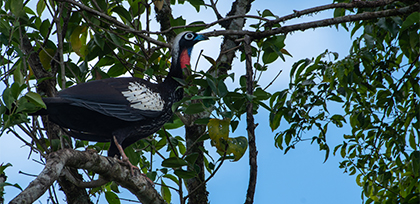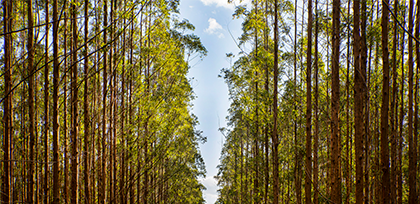Glossary
Bio-oil: a black liquid obtained through the pyrolysis process, in which biomass is subjected to high temperatures in an isolated environment with little or no oxygen. It is mainly used as a fuel for heating and the generation of electrical energy.
Biomass: all organic matter of plant or animal origin used for the purpose of producing energy.
BOD5: biochemical oxygen demand. This is a standard test, performed at a constant temperature and during a five-day incubation period, to measure the oxygen consumption in water. It is measured by the difference of the amount of dissolved oxygen (DO) found before and after the incubation period.
Brazilian Association of Business Communication (Aberje): the main national reference center in the production and dissemination of knowledge and business communication practices.
Brazilian GHG Protocol Program: created in 2008, it is responsible for adapting the GHG Protocol method to the Brazilian context and for developing calculation tools for greenhouse gas emission estimates.
CDP: international non-profit organization that analyzes and recognizes the efforts of companies worldwide to manage the environmental impacts of their activities.
CFO Task Force: group of chief financial officers from 60 companies that are part of the UN Global Compact movement. The group committed to investing, over the next five years, more than USD 500 billion in the SDGs (Sustainable Development Goals) to promote a collective work of greater integration of these SDGs both within their own organizations and outside of them, seeking to attract new partners to the initiative.
Circular economy: an economy that keeps materials and products in circulation for as long as possible. The goal of the circular economy is to reduce waste by optimizing the design of materials, products, processes, and business models, utilizing materials that are recyclable, recycled, compostable, and/or biodegradable.
Climatology: the scientific study of climate, defined as weather conditions calculated over a period of time.
CO2eq: carbon dioxide equivalent is the unit for converting all greenhouse gases (GHGs) in terms equivalent to the amount of as if they were CO2, considering their planet-warming potential. It is the result of multiplying the tons of GHG emissions by their global warming potential.
COD: chemical oxygen demand. This is an indispensable parameter for studies on sanitary sewage and industrial effluents. It assesses the amount of dissolved oxygen (DO) consumed in an acid medium that leads to the degradation of organic matter.
COP27: The Conference of the Parties or COP is within the scope of an international treaty established by the United Nations Framework Convention on Climate Change (UNFCCC). It is the ultimate decision-making authority governing efforts to control greenhouse gas emissions. COP27 was held from November 6 to 18 in Sharm El-Sheikh, Egypt.
Crude Tall Oil (CTO)/ Tall oil: raw vegetable oil (crude) – unrefined – produced after the acidulation of the black liquor soap (extracted from pine) present in the chemical recovery process of the pulp and paper industries. Because it is a renewable forest-based oil, this ingredient can replace other petroleum bases, making its applications more sustainable.
Debottlenecking: the elimination of points (bottlenecks), within an industrial system, that limit the final production capacity, reducing productivity rates.
Dow Jones Index Score: companies participating in the Dow Jones Sustainability Index selection answer an extensive questionnaire, which is sector-specific. The questions, based on pre-established criteria, have different weights, thus resulting in an overall score for the company, which is a determining factor in its inclusion in the DJSI.
Dow Jones Sustainability Index (DJSI): a global indicator of financial performance. It was launched in 1999 as the first indicator of the financial performance of leading companies in sustainability at a global level.
Ecophysiology: the branch of comparative physiology that studies the physiological diversity in relation to the environment and its impact on the ecology of organisms.
Ecosystem services: the services that nature provides to mankind and that are indispensable for its survival, associated with the quality of life and well-being of society.
Financial Stability Board: an international body that monitors the global financial system and makes recommendations about it. It was established after the G20 summit in London, in April 2009, as a successor to the Financial Stability Forum.
GHG: greenhouse gases. These gases are those that absorb part of the sun’s rays and redistribute them in the form of radiation in the atmosphere, heating the planet in a phenomenon called the greenhouse effect. Carbon dioxide (CO2); methane (CH4); hydrofluorocarbons (HFCs) and perfluorocarbons (PFCs) used in aerosols and refrigerators are examples.
Hydrosolidarity management: set of practices that enables proper guidance on the use of land and other natural resources in order to produce environmental goods and services, without affecting the soil and water.
IFC/IPCC: Intergovernmental Panel on Climate Change. Created by the United Nations Environment Program (UN Environment) and the World Meteorological Organization (WMO), it aims to provide policy makers with regular scientific assessments of climate change, its implications and possible future risks, as well as propose adaptation alternatives and damage mitigation policies.
International Accounting Standards Board (IASB): the international non-profit organization that publishes and updates the International Financial Reporting Standards – IFRS.
International Financial Reporting Standards (IRFS): accounting standards issued by the IFRS Foundation and the International Accounting Standards Board.
Low-carbon technologies: processes, equipment, systems, and resources that aim to reduce the emission of greenhouse gases, such as carbon dioxide (CO2).
Precision agriculture: set of practices that use data collected in the field to promote the management of the plantation in a more efficient and assertive manner. The technologies provide a more comprehensive view of the production system, enabling the optimization of inputs, which in turn contributes to increased productivity and reduced environmental impacts.
Racial Equity Movement (MOVER): movement formed by 47 Brazilian companies that intend to work on the structures that perpetuate inequality in the country, breaking patterns and providing equally possible achievements for all.
RPPN: acronym for Natural Heritage Private Reserve. It is a private domain conservation unit (UC) category, whose objective is to conserve biological diversity. The creation of a UC does not affect the ownership of the property. In addition to contributing to the expansion of protected areas in the country, private reserves help to protect the biodiversity in Brazilian biomes.
Sexual harassment: a single act or repeated action in which a person, who may be a woman or a man, is embarrassed by a hierarchical superior, or by another person who has some type of ascendancy inherent to the exercise of the position, with the intention of obtaining sexual advantage or favor.
Tag along: a mechanism for protecting a company's minority shareholders, which guarantees them the right to leave a company if the company's control is acquired by an investor that was not previously part of the company.
UN's Global Compact: initiative promoted by the United Nations (UN) to engage companies and organizations in the adoption of ten universal principles in the fields of Human Rights, Labor, Environment and Anticorruption Practices, to develop actions aimed at addressing society’s challenges.
Unit: also known as a Stock Certificate, is a package of shares traded on the Stock Exchange, composed of 1 common share and 4 preferred shares.
Water body: generic designation for any water source; watercourse, river stretch, artificial or natural reservoir, lake, pond or underground aquifer.











